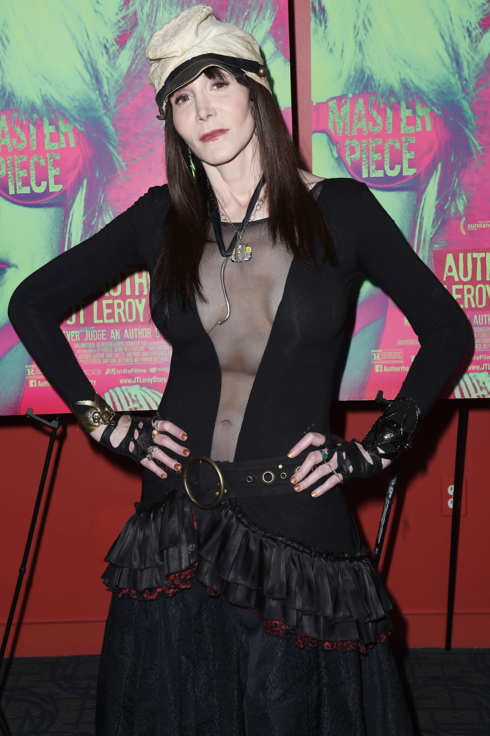 In 2005, JT Leroy died. Technically, of course, JT Leroy never existed. The transgender, HIV-positive, homeless child prostitute-turned-celeb author was the fabrication of two San Francisco women whose machinations were exposed by journalists in 2005. But during the nine years that Jonathan “Terminator” Leroy prevailed in the public sphere, he won the hearts and minds of the literati and glitterati alike.
In 2005, JT Leroy died. Technically, of course, JT Leroy never existed. The transgender, HIV-positive, homeless child prostitute-turned-celeb author was the fabrication of two San Francisco women whose machinations were exposed by journalists in 2005. But during the nine years that Jonathan “Terminator” Leroy prevailed in the public sphere, he won the hearts and minds of the literati and glitterati alike.
In last year’s excellent “The Cult of JT Leroy,” director Marjorie Sturm explored the smoke and mirrors behind this story, approaching it as the biggest hoax this side of “War of the Worlds.” As a San Francisco local who’d worked with mentally ill homeless people, Sturm had begun the documentary as an earnest homage, but upon the revelation that forty-year-old San Francisco resident Laura Albert and her twentysomething sister-in-law Savannah Koop had posed as Leroy (the former woman wrote his books and spoke as him on the phone; the latter posed as him in person), Sturm whipped off her rose-colored glasses and gave voice to the many who felt betrayed and manipulated. Through her lens, Albert was Dr. Frankenstein, Savannah was the Monster, and the artists, celebrities, and reading audiences were innocent, injured parties. Unsurprisingly, Albert refused to participate in the project, especially as myriad lawsuits were under way.
Now, “Author: The JT Leroy Story” has been released. Ostensibly by director Jeff Feuerzeig (“The Devil and Daniel Johnston), it feels like another brainchild by Albert herself, who, speaking in front of a blown-up printout of Leroy’s writing, presides over the film as if it were a big-screen podium. Slickly crafted from found footage and spidery animation, and told almost entirely from Albert’s perspective, the documentary threads back and forth from Leroy’s fame to Albert’s dark early years in group homes and the Boston punk scene. A Brooklyn native from a broken home, she relocated as a young wife to San Francisco, where she called a crisis hotline and began to channel the teenaged “Terminator” (later called JT Leroy; to date, she always references him as a separate being). The therapist on call swallowed the lie hook, line, and sinker, and encouraged him to work out his issues in writings. Thus begat Sarah, The Heart Is Deceitful Above All Things, and Harold.
Some may regard this film as the rope with which Albert can finally hang herself. I’m less and more convinced. The few other voices in this film are heard mostly in such A-list artists as Courtney Love and Gus Van Sant’s super-creepy recorded phone conversations with Albert-as-Leroy. Giving the author a platform so unmitigated by dissent gives us a fascinating glimpse into the extent of her self-rationalization. No one – not even Albert herself – is disputing her psychological instability but while “Cult” works on the assumption she’s also a moral horror show, “Author” doesn’t fuss itself over such concerns. Instead, it looks at how JT came to be – how Albert birthed him and then came to share him. It also looks at how others bought so wholly into this mirage even when, as in the case of actress/director Asia Argento, they were physically intimate with Savannah as JT. (No one has ever revealed the details of that exchange to the degree this inquiring mind want to know.)
Today, of course, a JT-like phenomenon could never happen. Cyber-stalking is so easy that he’d be dissolved before you could say boo, and it’s hard to imagine any author as a bona-fide celeb in our era of reality TV stars. Thus a ‘90s nostalgia encircles any telling of this cultural event. But there’s another angle on the JT Leroy story that neither documentary addresses, though “Author,” which opens with footage of Winona Ryder deceitfully gushing about how she first met Leroy “many years ago,” comes close. It’s the identity politics that allowed Leroy to come into being – in whether Leroy’s alleged literary talent would so quickly have been embraced then dismissed had it been taken on its own merits. The fact that the books are now largely out of print – that many seem embarrassed that they ever kvelled over them in the first place – suggests that it wasn’t the work that was being praised so much as the source. Or does it?
Perhaps it mostly suggests that aesthetic value is even more subjective than we allow. Certainly we expect something different from a fortysomething MFA than we do from a brutally marginalized adolescent. The JT Leroy story offers a unique mirror of the pyramid schemes we construct from oppression hierarchies, as well as our national propensity for myth-making. To date, no one seems willing to topple them.
This was originally published at Signature.
